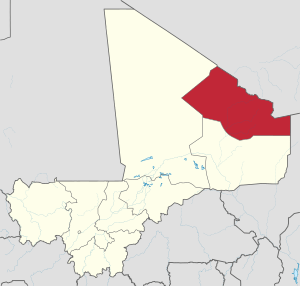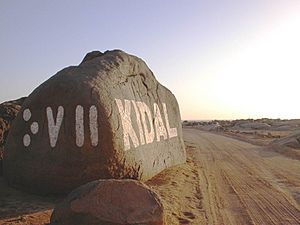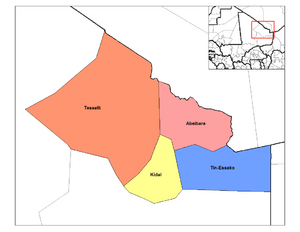Kidal Region facts for kids
Quick facts for kids
Kidal Region
|
|
|---|---|
|
Region
|
|

Location within Mali
|
|
| Country | |
| Capital | Kidal |
| Area | |
| • Total | 151,450 km2 (58,480 sq mi) |
| Population
(2009 census)
|
|
| • Total | 67,638 |
| • Density | 0.446603/km2 (1.15670/sq mi) |
Kidal Region is the eighth administrative region of Mali, covering 151,450 square kilometres or 58,480 square miles. This area was formerly part of Gao Region, but was created as a separate region in 1991. It is located in the north of the country, within the territory which the National Movement for the Liberation of Azawad proclaimed to be the independent nation-state of Azawad on 6 April 2012.
This independence has not been recognized by any country or international organization. It was under the control of different armed movements such as the Ansar Dine and MNLA until January 2013, when French forces liberated the region. The Region's administrative capital is the town of Kidal.
The primary trades of Kidal Region include livestock breeding, craft-making, and commerce. Commercial farming has been developed in some areas. The region is extremely isolated, with no paved highways or rivers for transportation.
The region is bordered on the west by Tomboctou Region, to the south by Gao Region, to the east by Niger and to the north by Algeria. Kidal has a desert climate with day-time temperatures that reach as high as 45°C (113°F).
The largest towns of the region are Kidal, Tessalit, and Aguel'hoc.
The region is peopled primarily by Tuaregs, a nomadic ethnicity of Berber origin. Their writing is the Tifinagh alphabet. Though nomadism remains the lifestyle best adapted to the difficult environment of the region, several settlements have emerged at Kidal: Aguel'hoc, Tessalit, and Tinzawatène.
Kidal Region is divided into 4 cercles that contain 11 municipalities:
- Abéibara
- Kidal
- Tin-Essako
- Tessalit
See also
 In Spanish: Región de Kidal para niños
In Spanish: Región de Kidal para niños



